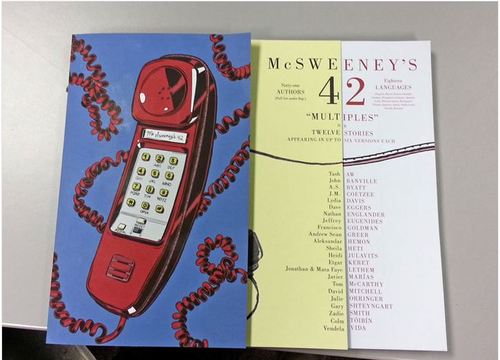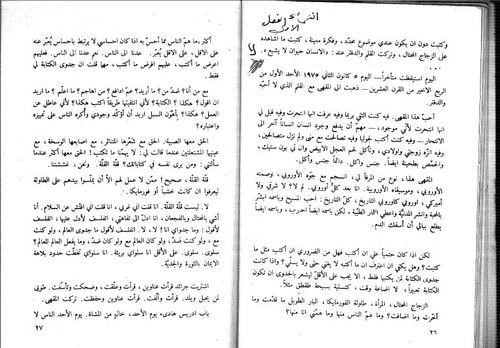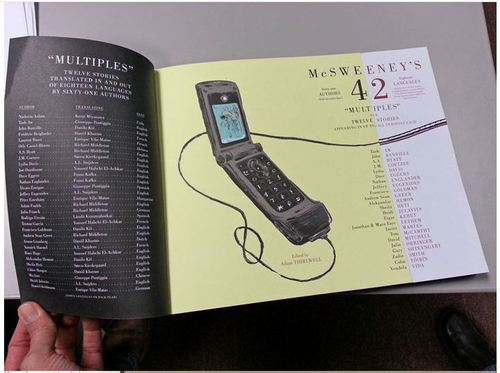
Back in 2011, the British novelist Adam Thirlwell began conceiving an issue of McSweeney’s that can perhaps most easily be summed up as a game of broken telephone. A text would be translated by one novelist-turned-translator, then that text would be translated by a second person, then the resulting text would be translated by a third. Ultimately, twelve separate texts were translated—each five or six times—for a total of sixty unique translations, all of which appear in the issue. The translators include Jonathan Lethem, Laurent Binet, Sarah Manguso, Javier Marias, and Lydia Davis. I emailed with Thirlwell about this fascinating project, which is now out as McSweeney’s #42.
– Sheila Heti
THE BELIEVER: Let’s start off with you explaining this issue and its constraints.
ADAM THIRLWELL: The experiment was an experiment in multiplying translation. The precise set-up we ended up with was to have 11 or 12 stories that were each translated by their own series of translators – where each translator, with just a couple of exceptions, was deliberately a novelist, rather than a trained linguistic professional. And each novelist-translator could only refer back to the previous version in the series – and not, therefore, the original. Apart from that, there were basically no rules.
Some novelists replied that they would only do it if they could do it as literally, as faithfully as possible. And some said they could only do it if they could essentially write a new story. As for me, I made no judgments. And so the idea behind this experiment was to test how far not just the basic plot-elements of a story might survive this kind of pressure cooker, but also how far its style would survive too, so I suppose the real experiment was with style. I think I was hoping to discover that, contrary to what most people might assume, the style of each story would somehow survive this ordeal. And I think in the end I was pleased that the results were way more sprawling than I’d anticipated.
BLVR: You began the issue with a translation of Kierkegaard. Can you say why you decided to start off with him? Why is he particularly timely or modern or interesting?
AT: Before we go anywhere with this I need to make a belated opening statement about this whole project – which is that randomness was very much this experiment’s theme. Very little of this experiment was controlled by its apparent editor. I would like to make that very clear as a kind of background to everything that follows…
And so although I’m happy that the project begins with SK, and would have loved to have planned that from the start, the truth is sadly no. I knew that I wanted something to be in it by SK, that was all – and so I asked the novelist Clancy Martin to translate something into English, and to choose something that wasn’t well-known at all. And he came up with SK’s ‘Writing Sampler’, which SK meant as a preface to a book of prefaces. And as soon as it came in it therefore occurred to me that this was the obvious piece to begin with: it’s the ultimate opening that isn’t an opening.
But in retrospect it definitely seemed more and more perfect that SK was there at the beginning, as the patron saint or household god or something. Just because I hadn’t quite realised what the project would end up implying about selves and styles and writing – and Kierkegaard is one of the first great experimenters with multiple personalities. I mean OK, it’s not the only thing that makes him a future writer. His whole ethical investigation still seems to me to be something way ahead of us. But that’s a delirious topic… And while I suppose you could say that this was meant to be a project with fiction, and he never quite wrote fiction, I’m not sure I’m interested in that distinction. As soon as you have an experimental self, then you’ve got yourself a character.
BLVR: Your mention of Clancy Martin makes me wonder: you must know many writers. What was your criterion for selecting them?
AT: I don’t think I know so many writers… I am no committed impresario. I just began with a miniature circle of people I knew, whom I knew I could emotionally blackmail, and then used them to try to blackmail people I knew a little less well. As it carried on I wondered if one thing I wanted to do was make a project out of a general condition: the international literary festival. That atmosphere always intrigued me, so I wonder if I kind of wanted to use this slightly floating condition of people who might meet once at some strange reading, and make that floating condition into something more concrete and productive.

(McSweeney’s Google doc of the process)
BLVR: When you were putting together this collection, was checking your email more exciting than at other times, or more stressful?
AT: It was initially more exciting because I was suddenly able to make emailing friends into a vast kind of office. Then it became super-stressful, what with forcing one’s friends to meet deadlines. One problem was the million time differences. Just as I’d be relaxing because South Americans were asleep, the Europeans woke up. In general I would say that I liked the additional stress and am also glad that stress is over and will never ever repeat it.
BLVR: Without mentioning names, were there some translations that disappointed you? That bored you? Could you get into that a bit for me, the reasons why, etc?
AT: So this is going to make me sound way more upbeat than I really am, but I don’t think any either bored or disappointed me. Sometimes I was expecting wildness from someone, and was intrigued to get a patient reproduction. Or sometimes I was expecting a careful reproduction, and got some kind of mad new version. But the result was always interesting, because it was always a sincere attempt at a very difficult problem.
I think in general I was interested in how moral novelists turned out to be. I think often I sent a story out into the world, and imagined that by the end it would come back a whole new thing. Whereas that only happened in a couple of cases. And if I try to investigate the reasons, I think I’d have to admit that novelists were much less happy at the idea of rewriting or changing something than I might have expected. It turned out they possessed probity. No one was selfish, and turned it into their own text only. With whatever super-stylist happened to be at the keyboard, the original version never got engrossed or overwhelmed.
On the other hand, I wonder if maybe I’m being a little untrue, in that the odd one or two maybe weren’t quite as interesting or fizzing as the others. I think what I discovered is that it wasn’t about whatever fidelity might mean, but something more about energy. Which might really mean that it was something to do with coherence. Maybe what a reader wants in a translation is a piece that has its own internal coherence – that’s possibly more important than the absence of occasional mistakes. The ones that didn’t quite work are ones where the author was unsure – as to whether to make it into their own thing, or make it ferociously other. And so the thing didn’t quite cohere on its own terms. But in fact, as soon as I say this I also think I’m being overhard. I’m just trying not to sound too excited by these authors’ amazing work. This suddenly downbeat conclusion is all your fault.
BLVR: Sorry! I’ll be more upbeat. Having finished this project, can you say what kind of person would make the “ideal” translator? Can there even be such a thing?
AT: I’m not sure there can be such a thing as an “ideal” translator. Or, it’s too easy to come up with aphorisms: like, the ideal translator will do to the new language what the original did to the first language, that kind of thing. And I like those kind of aphorisms but more and more I think they’re not helpful. It’s the same particularity as what makes a good reader. Maybe when we talk about someone being untranslatable, we just mean that this future ideal translator hasn’t arrived yet. Or missed the opportunity. Like take Pushkin. Everyone knows that somehow Pushkin in English doesn’t quite work. But then it occurred to me: the ideal translator of Pushkin would have been Byron! It’s totally obvious. Who else could have done such lightness with rhyme scheme?
BLVR: Wow! Too bad you weren’t around to tell him!
AT: Actually no, now I think about it – maybe Auden could have done it too! Why didn’t Auden do it? It’s too sad.

(Photocopy of Arabic original for the story by Al-Ashkar)
BLVR: Do you think there’s a “soul” or “essence” or “voice” of a writer that persists, no matter how well or badly he/she is translated?
AT: I think this is one of the questions that the experiment was meant to examine. According to one old theory, it might be that untranslatability is the condition of great writing. Because pure writing has so dissolved any distinction between form and content, that in the end its particular fascination can’t be replicated in another language. That’s the poetic kind of theory. And I think I used to think this, or at least I did sometimes. But I’m not sure that it’s true. Because there does seem to be some kind of soul that persists. And not only in one sense – that the meaning or feeling behind a text comes through; but also in another – that the soul of the style itself comes through. Because style can’t be just phonetics of sentences, and so on. But I love how ancient and un-chic the words all seem
BLVR: That’s interesting – I would have imagined the opposite: that translatability would be the condition of great writing – that what it means to have written something great is that there is something so powerful in it that can communicate even through the scrim of the worst translation.
AT: Maybe novels cope better than poetry with being mutilated and deformed. Their style functions differently. The real problem is how much weight to put on the loss, or on the inevitability of loss. I think there are very many emotional or neurotic aspects to this. It’s often as if some people want to say that if something isn’t a pure substitute for the original, then it’s a failure – whereas surely in fact it’s just a likeness, and it would only be hysterical to attack a likeness for not being a perfect replacement. And one thing that does seem true is that often linguistic turns and tropes that can’t be repeated in a new language turn out not to be so crucial to a story’s stylistic essence: the essence turns out to be much more a cloud and mobile. It’s a vaster thing than maybe we used to think, a novel’s style. That’s one possible conclusion
BLVR: Thinking about it as “a likeness” is very relaxing. That comparison had never occurred to me. Did you think about it like that always, or are you only thinking about it like that since the project?
AT: In fact, I’m stealing this idea from David Bellos, a Princeton professor and, more importantly, translator of Georges Perec and Ismail Kadare. Around the time I was first putting this project together, the NYT asked me to review his new book on translation: Is That A Fish In Your Ear? and one of his arguments is that we have to stop thinking of translation as substitution. “A translation is more like a portrait in oils.” I remember I loved this analogy so much that I wanted to write an extra digressive paragraph using Picasso – there’s this great thing Picasso once told Brassai which I’ve always loved: ‘I always aim for likeness. A painter has to observe nature, but must never confuse it with painting. It can be translated into painting only with signs.’ And I remember thinking, I want the Picasso of translation! The Bellos analogy is so good because it neatly shows how much more flexibility there could be in the way people think about translations: each one is just looking for equivalent signs, not perfect reproductions.

BLVR: What happened, in the translations, to the original authors’ styles? Was anything preserved of it through the multiple translations?
AT: I sort of feel that you need to make this question larger – because not only is it interesting to weigh up whether the original author’s style persisted, but also whether each novelist wrote something in which not only was the original’s style preserved but also their own. You, for instance, translated Jean-Christophe Valtat’s version of Kierkegaard. The questions therefore are: a) is Kierkegaard still there? b) is Jean-Christophe still there? c) are you still there? But also d) is there some way in which the styles of the previous translators in that series – JM Coetzee, Cees Nooteboom, and Clancy Martin – survive as well?
The startling or disturbing possibility, I think, is that something supra-personal emerges, that’s both still the original, and also at the same time belongs slightly to each translator. But these questions of property – they need way more giant thinking. I am not equal to it today.
BLVR: Okay then, a simple one: do you justifying left or full-justify when you’re translating?
AT: It has to be fully justified, whatever it is I’m doing. I don’t know why. I like symmetry.
BLVR: Every writing project involves a transformation of the writer. Do you think you’ll write differently or approach writing differently, now that this project is done?
AT: I think I’m very intrigued by the possibility for future collective projects. I didn’t realize they could be both so fun to read, and also so fruitful with new conclusions. And so yes, maybe this will change how I approach my own writing. Or might do for a while. I think now I’m much less interested in the repetition of something I might see as my voice. Or my style. That used to be my obsession, I think. Why should it be valued to talk in the same way always, and about different things? That’s the deep worry I’ve now got.
BVLR: “The repetition of voice” does seem to be what we return to writers for; we want to read that Hemingway voice, that Gertrude Stein voice. The kids today would use the word “brand.” It seems nice to subvert that, but beyond subverting that, maybe there’s something strange about expecting writers to always write the same way. Can you think of any great writers from history who are much more chameleon-like?
AT: On that ‘brand’ thing, I totally agree. That’s how the kids would put it. I’d sort of like to register a sense of being torn – in that the discovery of that kind of voice or style is I think something way deeper than its new alias ‘brand’. I don’t think a style is just some late-capitalist mirage or convenience. It’s an extraordinary thing, when someone reaches a unique style – so I in no way intend any absolute negation of that kind of work. But sometimes it does worry me with my own writing or writing I love – that its investigation sometimes seems maybe constrained or limited to this one thing.
As I think about this, the main comparisons of ideal chameleons aren’t necessarily writers: like Picasso maybe, or Stravinsky. I suppose my main novelistic example would be Joyce – but even with Joyce, there’s a certain tone or something that’s always there, whether in Portrait or Ulysses or Finnegans Wake.
BLVR: Yes, or think about Gerhard Richter…
AT: Totally! I’m torn between this ideal of stylistic uniqueness; and an equal ideal of stylistic multiplicity. And therefore between writing as the expression of the self; and writing as something that could be done in some kind of imaginary collective. But maybe the two aren’t contradictions
BLVR: I think they aren’t contradictions. The difference between one self and another really shouldn’t be so great, or at least, we should be interested in the points of unity. I’m always fascinated when a uniform style seems to create itself in certain circumstances, like on Wikipedia, or like how when you’re emailing with someone, you might take on their manner; like how hard it is to correspond with someone using caps if they don’t use capital letters.
AT: I think at some point in emailing you with this I’d begun something without beginning sentences with capital letters and then realized that you had always used capital letters. So I went back and changed it.
BLVR: That kind of fluidness between minds is real, and I think it’s part of what I love about this project – the generosity and the very human and basic aspect of trying to communicate in one’s voice another person’s voice.
AT: Yes! I’m really liking that word generosity. I think it’s exactly what’s going on in the project.
BLVR: So if “style” is no longer the ultimate ideal for you, what is?
AT: Truth.
BLVR: Finally, you guys designed the issue so the far edges of the pages aren’t protected by firmer stock. Do you worry that the pages will get damaged? Or do you not care about damage?
AT: I do worry slightly about this. On the other hand it’s a very beautiful object. And also, if this project’s proved anything, it’s that we really don’t need to be so precious about endless and irreparable damage.




